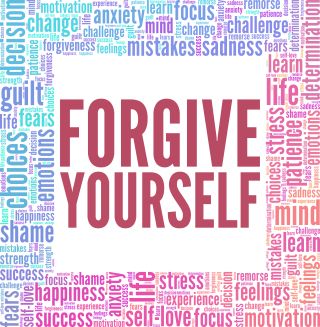Healing From Sexual Abuse: Forgiveness and Disclosure
Two powerful steps to heal the shame.
KEY POINTS
- The isolation of shame compounds the pain and confusion caused by childhood sexual abuse.
- Disclosing childhood sexual abuse to a trustworthy person or persons can be freeing and healing.
- When an individual has compassion for the ways they learned to cope with childhood sexual abuse, it can lead to self-forgiveness.
This post is part 3 of a series. You can read part 2 here.
Childhood sexual abuse creates tremendous shame in victims. This shame can affect everything from the person’s self-esteem and body image to a former victim’s ability to have a healthy romantic relationship. This is the third and final post on strategies for healing the shame of childhood sexual abuse, taken from my latest book, Healing the Shame of Childhood Sexual Abuse.
Strategy 6: Tell Someone About the Abuse
Although child sexual abuse can be difficult to disclose, it is imperative that you come to understand how vitally important it is for your emotional health and well-being. In fact, disclosing your abuse can be one of the most powerful ways to heal your shame.
CSA creates significant psychological wounds that are not only difficult to heal but often worsen over time. The more these wounds are denied, neglected, or hidden, the more they fester and the more they make themselves known in physical, psychological, and relational symptoms. Keeping the abuse a secret creates a toxic environment that breeds shame, self-blame, and even self-loathing. In addition, secrets create shame, and this shame makes us build walls between ourselves and others. Your pain has to be borne alone. This isolation compounds the pain and confusion caused by the abuse. Telling someone about the abuse offers you the opportunity to gain support and understanding.
Choosing who to tell is an important decision and should be carefully considered. Choose someone who has shown you in the past that they can be trusted not to gossip; someone who is compassionate, caring, and sympathetic toward other people’s pain. Don’t disclose to someone who likes to blame the victim or who believes victims should just “get over it.”
Strategy 7: Forgive Yourself for the Harm You Have Caused Others and Yourself
Self-forgiveness is the most powerful step you can take to rid yourself of your debilitating shame. Absolutely nothing is as important for your overall healing from the abuse and its effects. The more you heal your shame, the more capable you will become of having empathy for others. This will cause your relationships to change and deepen. You will also have more compassion for yourself and your suffering and you will be able to recognize and admit how you have harmed yourself and others. More importantly, your relationship with yourself will improve. You will be far less critical and self-loathing.
The most effective way of forgiving yourself for the harm you have done to others as well as to yourself is to gain self-understanding. You do this by making a connection between your harmful acts and the sexual abuse you experienced.
Those who were sexually abused tend to be particularly hard on themselves. They have unusually high expectations of themselves and they chastise themselves unmercifully when they make a mistake, especially when their behavior harms another person. They seldom, if ever, take the time to compassionately search for reasons why they may have behaved as they did. Instead, they tend to have a “no excuses” policy when it comes to their own behavior.
Time after time, I have found myself explaining to clients that I have actually never met a victim of CSA who didn’t react to the abuse by behaving in problematic ways including: abusing alcohol or drugs; sexual acting out; promiscuity and sexual addiction; other addictions such as compulsive overeating; acting out against society (i.e. shoplifting); self-harm; abusive behavior toward others; or a pattern of staying in abusive relationships.
Instead of viewing yourself as a “bad person” because you have reacted to the sexual trauma in sometimes troubling ways, my hope is that you will come to recognize that the negative things you have done do not represent who you are at your core but are the ways that you learned to cope with the trauma you experienced. In turn, my hope is that this self-understanding will help you to begin to treat yourself in far more compassionate ways.
The truth is, we have all harmed others. Knowing this and knowing that you are not alone can help you have compassion for yourself and forgive yourself. Feeling compassion for yourself does not release you from taking responsibility for your actions. But it can release you from the self-hatred that prevents you from forgiving yourself and free you to respond to the situation with clarity. Rather than tormenting yourself with guilt and shame, having compassion for your own suffering and for the suffering of those you have harmed can help you achieve the clarity necessary for you to think of ways you can help those you have harmed.
When you examine your mistakes and failures, it becomes clear that you did not consciously choose to make them, and even in those rare cases when you did make a conscious choice, the motivation for your actions was colored by your abuse experiences. For example, because of the shame you have carried, you closed your heart to others, and you became blind to how your actions were harming others.
Exercise: Your Sins and Omissions
This exercise is an adaptation of a “common humanity” exercise created by Kristin Neff:
- Write a list of the people you have harmed and the ways you have harmed them.
- One by one, go through your list and write down the various causes and conditions that led you to this action or inaction. Pay particular attention to making a connection between your harmful actions and the fact that you were abused or neglected.
- Now ask yourself why you didn’t stop yourself from harming this person. For example, were you so checked out that you didn’t even realize you were harming someone? Were you so full of rage that you couldn’t control yourself? Did you hate yourself so much that you didn’t care how much you hurt someone else? Had you built up such a defensive wall that you couldn’t have empathy or compassion for the person you harmed?
- Now that you have a better understanding of the causes and conditions that lead you to act as you did, see if you can apply the concept of common humanity toward yourself: You were an imperfect, fallible human being, and like all humans sometimes do, you acted in ways that hurt someone else. Honor the limitations of your human imperfection. Have compassion for yourself. Forgive yourself.
It can be difficult to actively focus on healing the damage caused by childhood sexual abuse. I hope these strategies, and the ones I have offered in my two previous posts, have given you some ideas and some encouragement as to how you can move forward to heal the shame connected to your experience of childhood sexual abuse.
References
Engel, Beverly (2022). Freedom at Last: Healing the Shame of Childhood Sexual Abuse. Guilford, Connecticut: Prometheus Books.




Leave A Comment